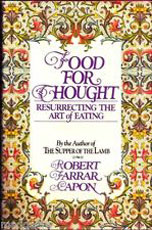Robert Farrar Capon's Food For Thought: Resurrecting the Art of Eating is another work which refuses to expurgate religion from daily concerns. Near the beginning of this combination cookbook and handbook for spiritual renewal, Capon asks: "Is resurrection an odd category in a cookbook? Not really. One of the things Jesus did after the first Easter was whip up a breakfast of broiled fish." Sound a bit flip? It might seem that way to those not familiar with Capon's inimitable habit of relating Biblical and theological material to everyday activities. But he is very serious:
"This book is about renewal. And though it deals with what are commonly thought of as the lesser things of life, there is no way of touching even them without being dragged all the way to death and resurrection."
Capon clearly enjoys cooking. He outlines how to set up a workable kitchen with an economy of equipment ("If you do not have a toasting fork make one"). He then delineates the importance of seasonings ("Cooking is the expansion, by reason and skill, of flavor into art"); points out all the creative things one can make with vegetables ("Vegetables are the first province of the kingdom of variety to be reconquered"); argues for the aggrandizement of grains (making a good case for freshly baked bread); and further suggests that we break with beef ("We eat beef to an excess bordering on fixation, if not irresponsibility"). His recipes abound in savory delights. He categorizes them as "written suggestions from one artist to another."
Interspersed within this interesting and practical information are a number of recipes for Christian living. There are notes on faith, hope, grace, forgiveness, death, and resurrection. A few tastes to whet your appetite:
"The longer I live, the more I think the major sin is boredom. Not blasphemy, which is just making proud noises when you can't think of anything better to do; not even idolatry, because that is only a silly escape from the real to the artificial. The true menace to life — the root of all the dangerous things we do — is being sick and tired."
The church is filled with people who are sick and tired. It's not that they want to sleep through life; it's just that they have not woken up to all the wild possibilities. Religious education in our time ought to equip the saints to come alive to the party that's going on all around us. Even, Capon adds, in the kitchen: "A soup is a meeting, a party, a game arranged for the ingredients by the water. . . ."
"God has made us temporal creatures; and he has set us in a congenial world where everything else has its time and place — where there are due seasons, high times, and happy rooms for the keeping of our company with rocks and rills, with raspberries, radishes, and rutabagos."
Another challenge for religious educators is to locate, explicate, and celebrate more rituals in the midst of our everyday life. 0 taste and see the glories of God refracted in the rhythms of our hungers, entertainments, and familial get-togethers. Capon, too, reminds us of the potter. What is most important is what remains after the food has been eaten.
